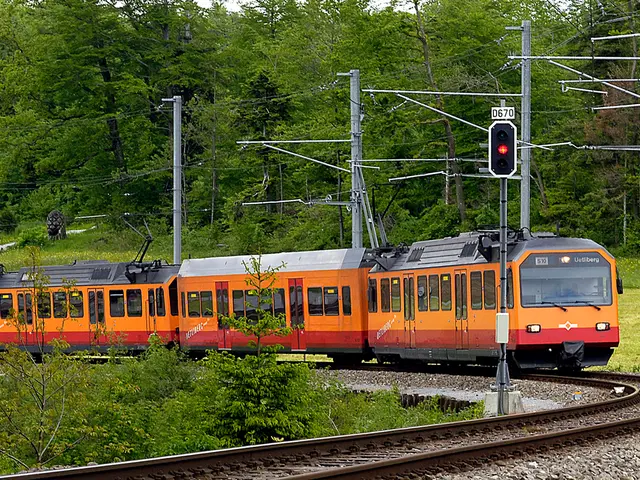Flixtrain Announces Substantial Fleet Expansion in Long-Distance Rail Travel
Expansion in Flixtrain's Fleet - Potential Benefits for Passengers? - Expansion of Flixtrain Fleet: Potential Advantages for Passengers?
Passengers seeking more options for long-distance rail travel may soon have a broader selection. Flixtrain, long-time rival of Deutsche Bahn in long-distance traffic, plans to significantly expand its fleet of high-speed trains, drawing speculation about the potential benefits for passengers. The company has ordered approximately 30 new trains from Spanish manufacturer Talgo, with an option for an additional 35, according to its announcement. The cost of the deal including maintenance is estimated to reach up to €2.4 billion.
The upcoming trains are anticipated to reach speeds of up to 230 kilometers per hour and offer barrier-free access. The locomotives are believed to be provided by technology conglomerate Siemens, although delivery dates remain unclear, as they typically take several years for these types of orders.
Positive Prospects for Rail Travelers
The news has been welcomed as a encouraging sign for rail travelers, according to Dirk Flege, managing director of the rail interest group Alliance pro Schiene. "There is tremendous potential, particularly in cross-border travel," Flege said. Flixtrain has recognized these opportunities and passengers can look forward to enhanced services in the coming years.
Founded in Munich, Flixtrain is known for its eco-friendly long-distance bus service. In long-distance traffic, it stands alongside the Austrian Federal Railways (ÖBB) and several night train providers as one of the few competitors of Deutsche Bahn, which currently maintains a market share of around 95 percent.
Flixtrain Poised to Grow Fleet Fivefold
With 65 new trains, Flixtrain aims to nearly quintuple its existing fleet, a significant leap from its current reliance on partner companies to provide trains for its services. The company focuses on busy routes such as Berlin to the Rhineland, Hamburg, Frankfurt, and Baden-Württemberg, where demand is high. Unlike Deutsche Bahn, the company does not have a fixed timetable, offering limited train connections between cities such as Berlin and Cologne each day.
Flixtrain's CEO and co-founder, André Schwämmlein, emphasized the company's aspirations to increase market share and expand the market itself. The offer will grow substantially in the coming years.
Deutsche Bahn Responds Calmly
A Deutsche Bahn spokesperson expressed calmness in the face of competition. "Competition between railway transport companies drives growth," they said, adding that they will face the challenge presented by Flixtrain.
Support from the Minister of Transport
CDU's newest Minister of Transport, Patrick Schnieder, expressed enthusiasm for the investment: "A German tech company investing on this scale is a strong signal for the rail market," he said.
Christian Böttger, a transport researcher and rail expert from the Hochschule für Technik und Wirtschaft Berlin, sees potential benefits for passengers. "More train providers may offer diverse services, possibly deviating from traditional routes and introducing alternatives," Böttger suggested. Examples might include train routes via Frankfurt-Süd instead of the Frankfurt main station or connections between less crowded suburban railway stations.
However, the venture comes with risks. Böttger noted the challenges posed by infrastructure limitations and questions surrounding continued government support. Overcrowding is a significant concern, with passengers facing regular delays and cancellations due to the saturated rail network. Rising track prices could also become an issue as transport companies pass these costs onto consumers.
- Flixtrain
- Fleet
- Long-distance traffic
- German Rail
- Berlin
- Hamburg
- Christian Böttger
- Siemens
- Alliance SE
- Dirk Flege
Enrichment Data Evaluation:
- Relevant details:
- Potential competition benefits, leading to expected improvements in service quality and customer choice [1].
- FlixTrain's focus on creating affordable and sustainable high-speed rail travel [2].
- New trains' design for energy efficiency, supporting FlixTrain’s goal of promoting sustainable travel and alignment with broader European goals [3].
- Excluded details:
- Trivial personal information or unrelated background details.
- Speculative, opinion-based, or emotional language.
- The expansion of Flixtrain's fleet could potentially bring about enhanced service quality and increased customer choice in long-distance rail travel, as more trains are introduced on busy routes such as Berlin to the Rhineland, Hamburg, Frankfurt, and Baden-Württemberg.
- The investment in new trains by Flixtrain, coupled with partner companies' provision of trains for their services, may lead to a diverse range of vocational training opportunities in the rail industry, particularly in maintenance, finance, and transportation sectors, to ensure the efficient operation and growth of the expanded fleet.







